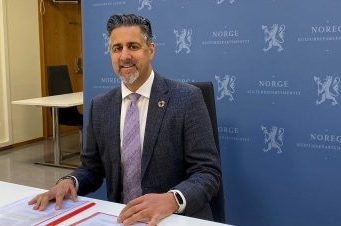A decision by Oslo’s new Conservatives-led city government to decorate the street outside City Hall for Ramadan this year has stirred debate, also as the month-long Muslim fasting period draws to an end. The goal was to promote fellowship, inclusion and diversity, but critics weren’t impressed.

“I think it’s important that the city shows how we value diversity, and want to make everyone feel included,” said Eirik Lae Solberg, who now leads Oslo’s city government after his Conservative Party won last autumn’s local elections.
Solberg and his Oslo government colleagues got the idea to decorate Roald Amundsens gate (the street that wraps around City Hall) from London, where Ramadan decorations featuring stars and a crescent moon were lit for the first time last year. They settled on decorations that were lit from sundown March 10 and will remain to be until April 9, when the annual month of Ramadan ends with feasts and celebration.
“This is an important symbol,” Solberg said in his speech when the decorations were first lit before a large crowd outside City Hall. They cost around NOK 1.5 million (nearly USD 150,000) and Massom Zubair of Norway’s Islamic Council called it “an historic moment.” He expressed “great joy and gratitude” in his own remarks at the event, over how “Oslo wants to mark and celebrate Ramadan together with us all.”
‘Unfortunate signal’
Magnus Birkelund, group leader for the right-wing Progress Party on the Oslo City Council, had already criticized the decorations, however. Birkelund claimed the city should rather have invested more in helping young women in Muslim families who live in fear of social control stemming from a controversial code of honour. Many aren’t allowed to live freely like other young Norwegians, and have been sent into forced marriages or even killed in extreme situations.
Birkelund claimed the decorations also “send an unfortunate signal” that the city government, which always decorates for Christmas, is only willing to celebrate the Muslim religion along with Christianity. “Even though Islam is now the second-largest religion in Oslo, it’s wrong to not also celebrate the Buddhist, Hindu, Jewish and Orthodox Christian religions,” he told newspaper Aftenposten.

Solberg responded that the city is already working to address negative social control in Muslim families and violence tied to male family members’ definition of honour. “The city government will be following up on that,” Solberg told Aftenposten. “It’s important that we distinguish Islam as a religion from unacceptable practice.”
Abid Raja, deputy leader of the Liberal Party and a Member of Parliament, grew up with a violent father from Pakistan and has been at the forefront of championing women’s rights threatened by negative social control in some Muslim families. “How generous can we be with one another,” he questioned in a recent commentary. “Is the limit drawn when we light decorations in the streets?”
Raja claimed the city’s new Ramadan decorations have been a joy for tens of thousands of Muslims during this past month of fasting. “Unfortunately the lights have also sparked anger, which I think is based on fear of the unknown,” he wrote. The lights, he added, “don’t mean Norway is becoming Islamic, or that we can’t criticize attitudes among some Muslims.”

Raja also noted that he “really loves Christmas decorations, and Christmas songs and traditions. I’m also born in Norway, into a Muslim family. Sharing traditions can bring us closer together and help us understand each other better.”
Rania Al-Nahi, a member of the theology faculty at the University of Oslo, agrees, calling the this year’s new Ramadan decorations “a small step in the right direction” in a commentary of her own in newspaper Klassekampen on Thursday. She was saddened by the debate in which critics claimed the city government was “bowing to authoritarian forces” or that the decorations were merely a “gimmick” from politicians without real content.
“Personally I think the city should of course wish our neighbours, fellow citizens and friends a happy celebration of something that’s important for them,” Al-Nahi wrote. “This is all about finding a way towards a more inclusive society, where everyone feels seen, heard and respected, regardless of faith, ethnicity, culture or attitudes.”
NewsinEnglish.no/Nina Berglund

